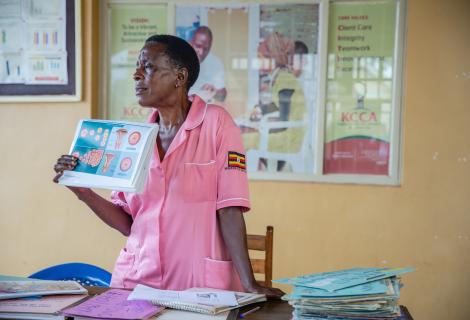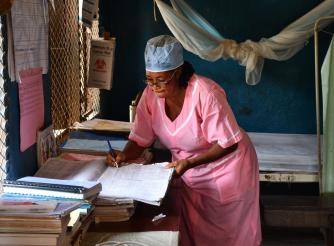$2.8bn ‘tax gap’ exposed by ActionAid research reveals tip of the iceberg of ‘Big Tech’s big tax bill’ in the global south

- New research from ActionAid International reveals that 20 developing countries could be missing out on as much as $2.8bn in tax revenue from Facebook, Alphabet Inc. (parent company of Google) and Microsoft due to unfair global tax rules.
- Potential taxes raised from these three ‘Big Tech’ companies alone could address the World Health Organisation’s (WHO) estimated shortages of more than 1.7 million nurses in these countries within just three years.
- $2.8bn could pay for 729,010 nurses, 770,649 midwives or 879,899 primary school teachers each year in 20 countries across Africa, Asia and South America.
- The research is released as the G20-mandated and OECD-led corporate tax reform process failed to meet the original deadline amidst political and technical challenges; and in advance of Alphabet Inc. publicly reporting its latest quarterly financial results on 29 October, following today’s shareholder conference.
ActionAid International has today (Monday, 26 October) published new research on the scale of potential tax revenue that could be raised from ‘Big Tech’ companies operating in the global south.
ActionAid’s new research analyses Facebook, Alphabet and Microsoft and the potential tax revenue that their market activity could generate, if the tax regime and resulting corporation tax bills better reflected these companies’ economic presence. ‘2020 Quarter Two’ reporting of ‘Big Tech’ companies revealed how shares have soared as a result of increased sales during the outbreak of the pandemic.[1]
Little is known about how much tax these companies are currently paying in developing countries, as they are still not required to publicly disclose this information. This research shows, however, that billions could be at stake in the long overdue reform of international corporate taxation – enough to transform underfunded health and education systems in some of the world’s poorest countries.
The world desperately needs a global tax agreement which ensures companies are taxed according to their real economic presence. Developing countries offer tech businesses new markets, increased global brand recognition and billions of new users’ data, which translate into continuing revenue growth.
ActionAid is also calling for a global minimum rate of corporate tax to resolve the issue of multinationals using tax havens to lower their tax bills. Governments urgently need this money to fund public services such as healthcare and social protection for the billions of people affected by the Covid-19 pandemic.
Yet, the OECD has proven unable to deliver a new global tax deal.[2] A new UN-led process could be a solution to ensuring poorer countries have a seat at the table in developing global tax rules that affect their ability to invest in public services.
Given the urgent needs of women and young people impacted by Covid-19, hunger and unemployment, governments should take steps to tax tech companies, in lieu of a global deal being agreed. These taxes should be progressive, targeting the enormous profits of tech giants, ensuring the costs aren’t passed to the users.
If all governments compelled all companies to publicly report their financials in each country where they have a presence, a clear route to fair taxation would be possible.
The potential $2.8bn ‘tax gap’ calculation is based on the share of the three tech giants’ global profits, relative to their number of users and adjusted for countries’ GDP per capita, which accounts for users’ relative values across the 20 countries studied.[3]
India, Indonesia, Brazil, Nigeria and Bangladesh are the markets studied with the highest ‘tax gaps’ from these three companies. The total ‘tax gap’ for the 20 countries contained in the research is $2.8bn, equivalent to 729,010 nurses, 770,649 midwives or 879,899 primary school teachers.
The WHO estimates that the 20 countries studied by ActionAid need to employ at least 1,790,000 more nurses by 2030 to achieve their benchmark of 40 nurses per 10,000 people. These shortages of nurses could be fully covered in just three years if global tax rules allowed fair taxing of these three ‘Big Tech’ companies and the revenue was allocated for this purpose.
David Archer, global taxation spokesperson for ActionAid International, said:
“Women and young people are paying the price for an outdated system that has allowed big tech companies, including giants like Facebook, Alphabet and Microsoft, to rack up huge profits during the pandemic, while contributing little or nothing towards public services in countries in the global south.
“The $2.8 billion tax gap is just the tip of the iceberg – this research covers only three tech giants. But alone, the money that Facebook, Alphabet and Microsoft would be paying under fairer tax rules could transform public services for millions of people”.
Commenting on the research findings Alex Cobham, CEO, Tax Justice Network, said:
“The Covid-19 pandemic has confirmed the urgent need to reprogramme our tax systems. In 2013, the G20 asked the OECD to deliver reforms that would make sure taxable profits were declared where companies’ real economic activity takes place.
“Eight years later, ActionAid’s research shows there has been no progress – so that even in countries where public services are desperately short of resources, the excess profits made by digital companies during the pandemic, while local businesses are ordered to lock down, are not giving rise to a fair tax contribution.”
Data is revealed in advance of Alphabet reporting its latest quarterly profits on 29 October. It is expected that Alphabet will reveal huge profits which depend significantly on the 1.5 billion people in these 20 countries who use their products.
In the absence of more transparent reporting requirements it is impossible to determine how much tax, if any, Alphabet or other big tech companies pay to the governments in these countries. If global rules were fair and effective, they could raise enough in tax from Alphabet alone to employ 244,360 nurses, transforming the public health response to Covid-19 in these 20 countries.
ENDS
EDITOR’S NOTES
About ActionAid International.
ActionAid International is a global movement for the rights of women and young people – united in our fight against inequality and our pursuit of international social justice.
For more information and interviews, please contact jenna.pudelek@actionaid.org or call 07795642990.
Methodology:
Calculations of the potential ‘tax gap’.
Calculations refer to an estimated tax liability of these companies - the ‘tax gap’ - if profits were allocated reflecting more closely their economic activity, as estimated based on the number of their ‘users’ in each country.
Profits are calculated based on each company’s 10K report for 2019, filed with the US Securities and Exchange Commission. Because these companies are not required to publish country-by-country reports, modelling is required to calculate profit at country-by-country level.
Apportioning of profits to each country is based on the estimated number of users in each country (using DataReportal’s Global Digital Overview Report) and adjusted for per capita GDP (current USD) to calculate the ‘value’ of users to each company in different countries, as a proxy for their economic activity. This ‘proxy’ chosen for the research methodology as ‘users’ adjusted for their ‘value’ was considered the most accurate available data for modelling profits, in the absence of publicly available data from the Big Tech companies in developing countries.
Tax rates applied are 25% for each country, in line with calls for a baseline of 25% corporation tax made by the Independent Commission for the Reform of International Corporation Tax (ICRICT).
Public service equivalents – nurses, midwives and primary school teachers.
Calculations of the number of public services workers are based on publicly available salary information for key public sector workers provided to the Wage Indicator Foundation's public sector worker database.
Salary information for midwives, nurses and teachers was available for 12 out of the 20 countries featured in this study. For the other 8 countries, data on average household incomes was sourced from the website worlddata.info and used to generate a prediction of salary based on household income in the relevant country compared to the 12 countries for which salary data exists.
The research has also drawn on data from the WHO’s 2020 State of the World’s Nursing report to determine the nursing shortages of over 1.7 million across the 20 countries. The WHO benchmark is that countries should have 40 nurses per 10,000 people.
[2] The OECD was mandated by the G20 to deliver a ‘consensus-based solution to tax challenges arising from the digitalisation of the economy’ by the end of 2020. It has now clear there is no consensus, and the process has been extended until at least mid-2021. From the outset, the process was criticised as lacking legitimacy due to the failure to adequately involve developing countries. The current proposals have been further criticised for lacking ambition.
[3] The 20 countries contained in this research include: Bangladesh, Brazil, Ethiopia, Ghana, India, Indonesia, Kenya, Malawi, Mozambique, Myanmar, Nepal, Nigeria, Senegal, Sierra Leone, South Africa, Tanzania, Thailand, Vietnam, Zambia, Zimbabwe.

